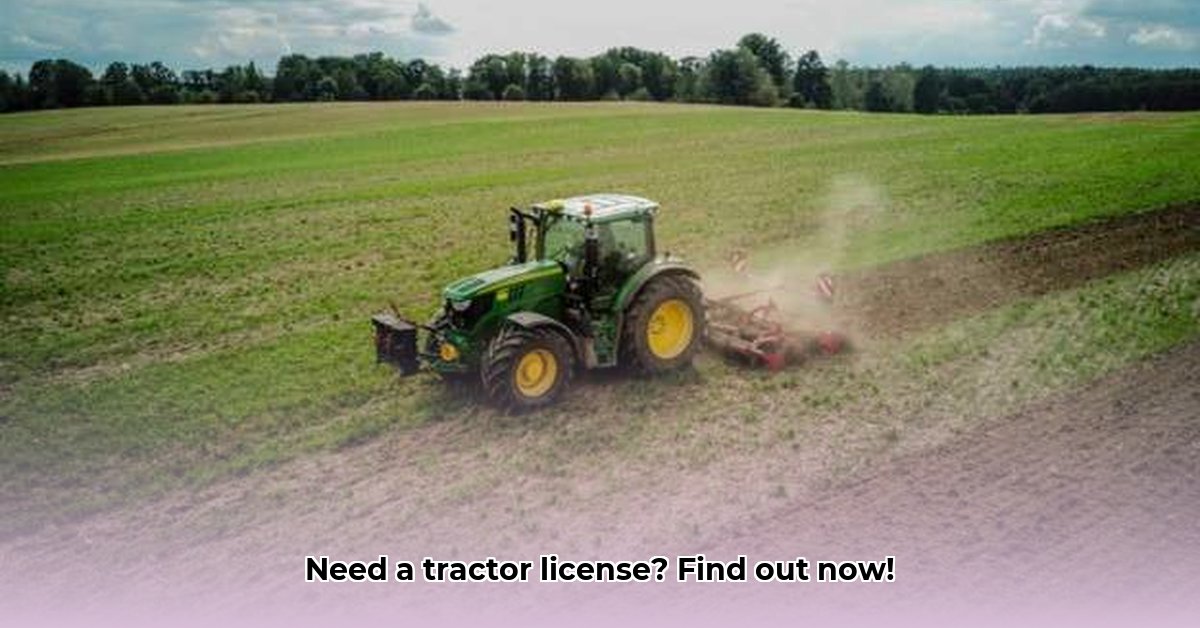
Do you need a license to drive a tractor? The answer, unfortunately, isn't a simple yes or no. The requirements for operating a tractor depend heavily on factors like your location, the type of tractor, and your age. This comprehensive guide will navigate the complexities of tractor licensing across various jurisdictions.
Tractor Types and Licensing Requirements
The size and intended use of a tractor significantly impact licensing needs. A small lawn tractor differs vastly from a large agricultural or construction tractor. Larger, commercial-grade tractors often necessitate specific licenses or endorsements, unlike smaller, personal-use models. Think of it like driving a car; a go-kart has different rules than a semi-truck.
Jurisdictional Variations: A Patchwork of Regulations
State, province, and country regulations vary widely regarding tractor operation. What's permissible in one area might be illegal in another. Some jurisdictions might only require a standard driver's license for smaller tractors, while others mandate specialized licenses for agricultural or commercial vehicles. Always prioritize verifying the specific regulations in your area.
Age Restrictions: A Key Factor
Minimum age restrictions for tractor operation frequently exist, varying based on the tractor's size and power. Operating larger, more powerful tractors typically requires a higher minimum age.
Specialized Licenses and Endorsements
Beyond a standard driver's license, some jurisdictions require endorsements or specialized licenses for operating commercial or agricultural tractors. These are especially crucial for professional tractor use. Do you need a Commercial Driver's License (CDL)? That depends on your location and the type of tractor.
Exceptions and Special Cases: Understanding the Nuances
Exemptions might exist based on location, farm size, or specific circumstances. For example, farmers using tractors solely on their land might receive exemptions in certain areas. However, these exceptions are not universal and must be verified with relevant authorities. It's crucial to thoroughly understand these exceptions before operating any equipment.
How to Determine Your Local Tractor Laws: A Step-by-Step Guide
Determining your legal requirements involves a methodical approach:
Precise Location: Identify your state, province, or country. This forms the foundation of your research.
Tractor Specifications: Detail the tractor's size, power, and intended use (farming, construction, personal use).
Consult Local Authorities: Visit your local Department of Motor Vehicles (DMV) or equivalent agency's website. Search for information on commercial driver's licenses (CDLs), agricultural vehicle operation, or similar regulations.
Deepen Your Research: Explore your state's agriculture or transportation department websites for more specific details. These often provide the most current information.
Seek Legal Counsel: If uncertainties remain, consult a lawyer specializing in agricultural or commercial vehicle regulations for personalized guidance.
Sample State Licensing Requirements (Illustrative – Check Local Regulations)
Disclaimer: The following examples are for illustrative purposes only and might not reflect the most current regulations. Always verify information with official sources.
| State | Potential Licensing Requirements (General Guideline) | Considerations |
|---|---|---|
| California | Often requires a CDL (Commercial Driver's License) for large commercial tractors. | Check for additional requirements for agricultural uses. |
| Iowa | Might only need a standard driver’s license for smaller tractors. | Regulations vary based on tractor size and intended use. |
| Texas | Similar to Iowa; depends on tractor type and use. | Contact the Texas Department of Public Safety for details. |
Remember: This is a general overview. Always check the specific regulations in your location before operating any tractor. The variance across jurisdictions necessitates thorough research to ensure legal and safe operation.